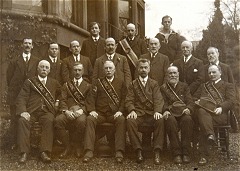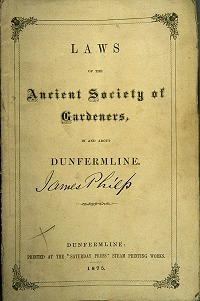Free Gardeners Home | Previous | Next

Free and working
The Dunfermline 'bond of union' follows almost exactly the form of a seal of cause or charter of an incorporation and the society refer to themselves throughout as both a fraternity and an incorporation. The Gardeners of East Lothian listed a set of 'Interjunctions' to which every member subscribed. These too follow the kind of rules and regulations expected in a seal of cause.
In Dunfermline the senior officer was called deacon, just as in an incorporation. Later the title 'Chancellor' was preferred. In Haddington, the titles 'President' or 'Chairman' were used. Both organisations were essentially democratic. The officials were elected and the box where their money and papers were kept was subject to regular audit.
Both societies had rules that regulated gardening in their areas. They discussed entry to the profession, gardeners' conduct, education, and the administration and benefits due by the societies.

However, both bodies included clauses that allowed non-practitioner members to join (at different rates to gardeners). This was an essential difference to incorporations. The status of their 'gentlemen' members was of importance to the Dunfermline gardeners. Their published history always contained a cumulative membership list headed by a duke, and naming a marquis, six earls, seven lords, eight knights and hundreds of professionals (soldiers, ministers, advocates) and other landowners or lairds. However, by the end of the eighteenth century such illustrious company had faded away except for a leavening of Dunfermline based professionals.
In contrast to Dunfermline, Haddington seems to have been a practical fraternity for a longer time. They too admitted 'free' gardeners from an early date, but most of them were shopkeepers and craftsmen in Haddington itself. A few ministers, doctors and lawyers also joined.
Free Gardeners Home | Previous | Next